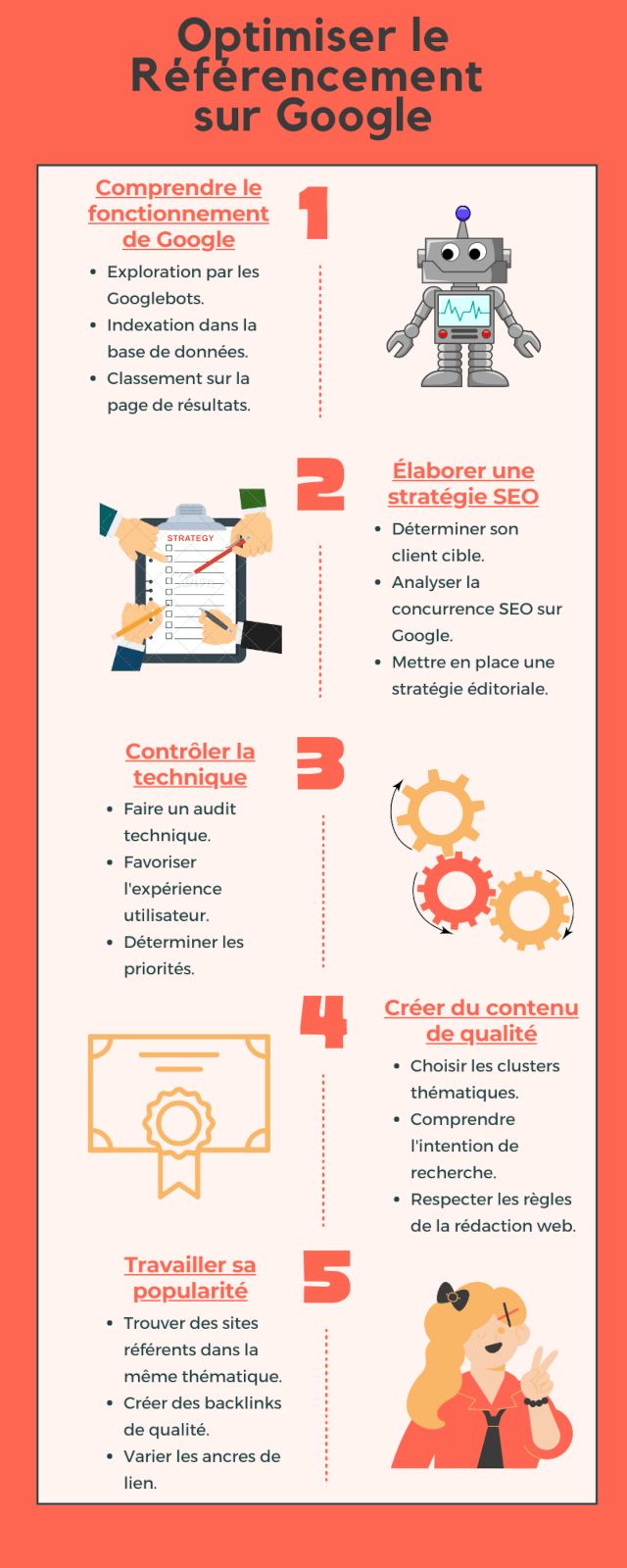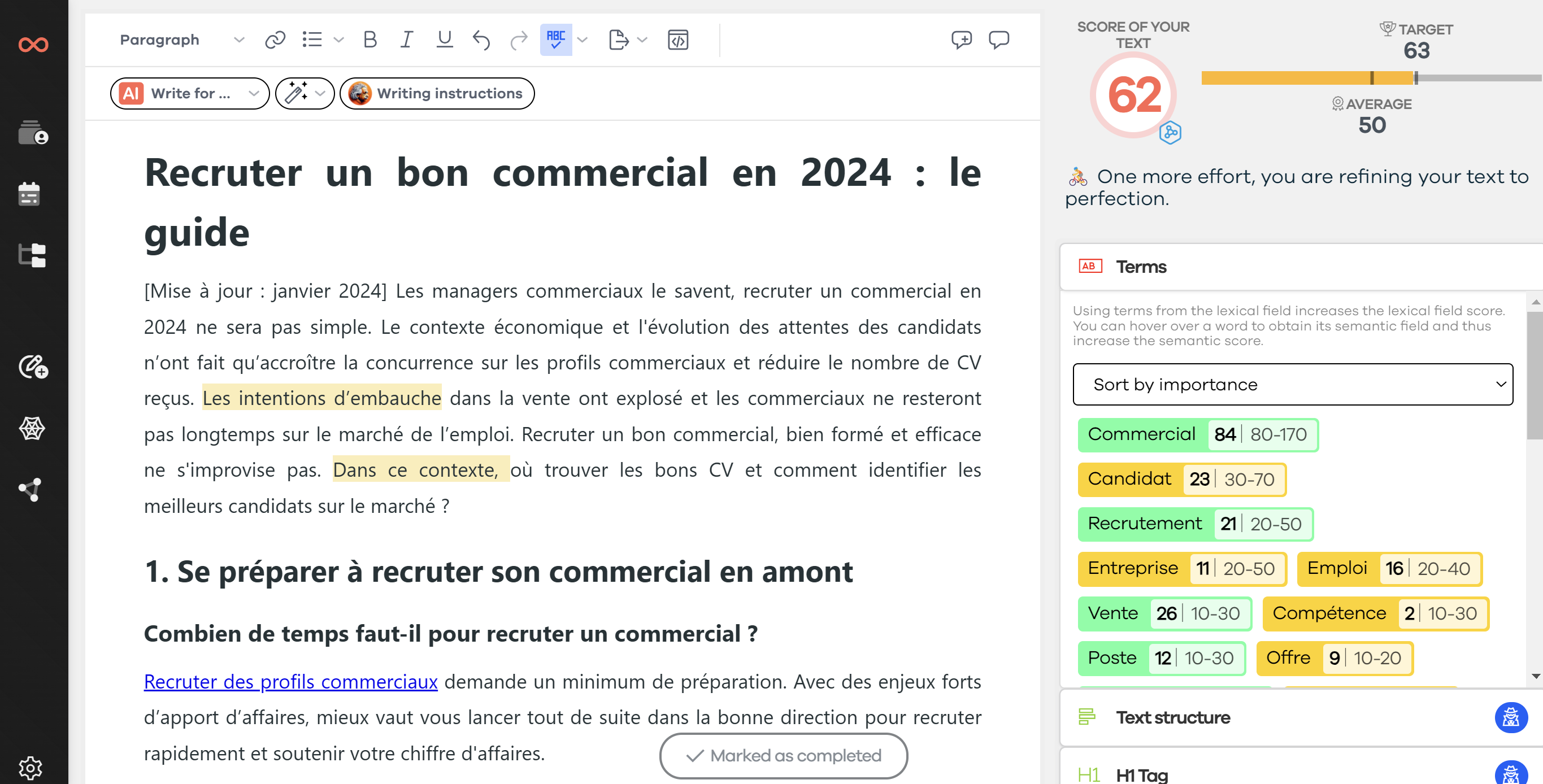Do you want to be visible on search engines and increase your organic traffic? To achieve this, you must first know all the basics of SEO. You can then optimize your website's Google ranking over time. In this blog post, I describe the best SEO optimization techniques for the 4 pillars of SEO: strategy, technique, content, and reputation.
🚀 Quick read: how to optimize SEO at a glance
If you only have a few minutes to learn how to optimize your Google ranking, here's an infographic that summarizes all the information in this article.

👑 Understanding how Google works

Before discovering how to optimize your website's organic ranking on Google, it is necessary to know at least the basics about the search engine. Indeed, it is the functioning of the search engine that determines whether the pages of your site deserve to be offered to users... or not!
Here are the 3 elements you should at least be aware of to know how to optimize for search engines in SEO (Google, Bing, Yahoo, etc.). You can then optimize your web pages to help Google in each of these steps.
- Crawling: Google's indexing robots (Googlebots) browse the Web in search of new pages and regularly check those already known.
- Indexing: The lexical and semantic field of the crawled pages is analyzed to classify them by category in a database.
- Ranking: The results are judged according to more than two hundred criteria before being displayed on the search engine results pages (SERP).
Also, be aware that Google has undergone many changes and continues to evolve. Once you have acquired the basic knowledge, I advise you to stay informed about new updates and recommendations from Mountain View. This way, you can anticipate the SEO impact of your actions and adapt your actions accordingly.
- Functioning and history of Google's search algorithm
- Google EAT criteria: why is it important for SEO?
- Content and SEO optimization: the complete guide for SEO professionals
- Google's ranking criteria in 2022
➰ Optimizing Google SEO: Strategy

Although SEO optimization involves concrete actions, you should not rush into random actions. Moreover, you must adapt what you do to the theme of your website, your target readers, and the display of results on Google's pages.
To do this, you must set up an SEO strategy that will guide your steps in the coming months. However, this strategy is not static and may evolve. So don't plan actions too far in advance! Below, I describe the 3 analyses that I believe are essential to perform before even starting to optimize your website.
- Determine your target customer: If you don't know who you're addressing, you have no chance of having a relevant message.
- Analyze the competition: Check what your SEO competitors are doing to discover what search engines appreciate in your field of activity.
- Implement an editorial strategy: Find the keywords on which you have a chance to rank and develop a content strategy.
Remember that there is no point in skipping steps and that organic SEO is a long-term bet. Don't push the algorithms too hard and take your time. Thus, you must absolutely focus on quality over quantity to have a lasting impact.
- The steps to follow to establish a good SEO strategy
- Personas in SEO: how to build a formidable strategy thanks to your targets?
- How to perform an SEO competitor analysis?
- Succeed in your editorial strategy in 6 steps
👨🔧 Optimizing Google SEO: Technique

The SEO optimization of your site's technique primarily aims to provide a good user experience (UX) to your visitors. On the other hand, you ensure that all elements are in place to help indexing robots crawl and index all the pages necessary for your visibility on the Web.
A technical SEO audit is long and complex but is essential for optimizing your Google ranking. At a minimum, I strongly recommend checking the 11 points below. If you find that all these technical criteria are not present on your site, I suggest you implement them as soon as possible.
- Mobile first: Is the mobile version performing well?
- Navigation: Is it easy and enjoyable to navigate from one page to another?
- Menu: Does it allow access to the most important pages in less than three clicks?
- Loading speed: Do your web pages load quickly?
- Links: Are all internal and external links up to date?
- Error 404: Are there indexed pages that no longer exist?
- HTTPS: Does your site offer secure access?
- Indexing: Can the site be indexed (no "noindex" tags!)?
- Robots.txt: Is it configured correctly?
- Sitemap.xml: Have you created one and is it well informed?
- Google tools: Have you connected your site to Google Analytics and Google Search Console?
- SEO audit, the essential checklist in 130 points (only)
- How to improve organic SEO on Shopify?
- SEO on Magento | How to optimize your organic SEO?
- 9 SEO tips for successful PrestaShop optimization
- How to optimize your SEO content on WordPress?
📚 Optimizing Google SEO: Content

A famous SEO adage says that content is king! Indeed, the only way to interest your readers is to provide quality information. And for Google to know what topic you are covering, you must clearly explain what you are talking about. To do this, you are therefore required to write texts with high added value.
Moreover, working well on your content significantly improves your visibility on search engines and attracts qualified traffic to your website. To succeed in optimizing your Google SEO content, I recommend implementing the 5 elements below.
- Define thematic clusters: Working on topics in their entirety demonstrates your area of expertise to both Google and users.
- Understand search intent: Answering the questions that Googlers ask helps retain SEO traffic (reducing bounce rate).
- Follow web writing rules: Captivating your reader from the start and allowing quick comprehension is essential for digital reading.
- Optimize the most important tags: Allowing quick content comprehension and conveying a clear message to Google helps improve your ranking.
- Take care of internal linking: Adding value to your texts while allowing indexing robots to easily browse your site is a significant SEO asset.
- Is the future of SEO the thematic cluster?
- Search intent at the service of content
- 42 tips for writing high-performing SEO content
- H1 tag: the guide to optimizing your SEO
- Title tag: best SEO practices
- Internal linking: the backbone of SEO
🥇 Optimizing Google SEO: Popularity

This is a sensitive point in organic SEO, but absolutely necessary to be visible on Google! Developing your reputation on the Internet is a balancing act that takes time. That's why I strongly recommend hiring an SEO consultant or a specialized agency to perform this task.
If this work is so particular, it's because it can hardly be done without violating the recommendations of search engines. Indeed, to optimize your Google ranking, your site must be recommended by other authoritative sites in the same theme as yours. However, buying a link (backlink) is penalized by Google! Here are 4 methods to acquire external links without violating SEO rules.
- Guest posts: You write a post on a blog and place a link to your site naturally.
- Online directories: You add your URL to a directory listing sites related to your theme.
- Customer recommendations: You ask your customers to add a link to your site.
- Service exchanges: You offer a product or skill in exchange for a free backlink.
- How to create a link building strategy to get external links (backlinks)?
- 17 techniques to find a backlink and link to your content
- Link anchors in SEO: 5 mistakes to avoid
🎬 Conclusion
You now have all the necessary resources to know how to optimize your website's SEO. You must work simultaneously on the 4 pillars of SEO, while respecting the guidelines issued by Google:
- Strategy
- Technique
- Content
- Popularity
Do you feel ready to optimize your website's Google ranking for your most important pages? Or maybe you have applied other SEO optimization methods that have made your site more visible on the Internet? In any case, feel free to share this article or let us know your point of view on the best SEO practices. Also, remember to visit our blog frequently to learn more about the fascinating art of organic SEO.
Need to go further?
If you need to delve deeper into the topic, the editorial team recommends the following 5 contents:
- Operation and History of Google's Search Algorithm
- Enhancing Content for Google with Search Console Insights
- 17 Techniques to Find a Link Building Opportunity and Link to Your Content
- How to Create a Link Building Strategy for Acquiring External Links (Backlinks)?
- Google EAT Criteria: Why is it Important for SEO?

